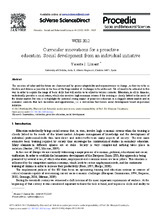Mostrar el registro sencillo del ítem
Curricular innovations for a proactive education. Social development from an individual initiative
| dc.contributor.author | Llorent García, Vicente J. | |
| dc.date.accessioned | 2017-08-29T10:34:56Z | |
| dc.date.available | 2017-08-29T10:34:56Z | |
| dc.date.issued | 2012 | |
| dc.identifier.uri | http://hdl.handle.net/10396/14998 | |
| dc.description.abstract | The societies of today and the future are characterized by greater adaptability and responsiveness to change, as they try to be as flexible and diverse as possible in the face of the huge number of challenges to be addressed. We all need to be educated in this way in order to acquire the range of basic skills that will enable us to adjust to various contexts. Education, in all its domains, undoubtedly provides a social return, which also involves high economic returns if the training is closely linked to the needs of the labour market.Our aim is to highlight the potential strong impact of proactive education in a sluggish labour market and in economic contexts that lack incentives and opportunities, i.e. a curriculum that fosters social development based on personal initiative. | es_ES |
| dc.format.mimetype | application/pdf | es_ES |
| dc.language.iso | eng | es_ES |
| dc.publisher | Elsevier | es_ES |
| dc.rights | https://creativecommons.org/licenses/by-nc-nd/4.0/ | es_ES |
| dc.source | Procedia - Social and Behavioral Sciences 46, 3619-3623 (2012) | es_ES |
| dc.subject | Innovations | es_ES |
| dc.subject | Curriculum | es_ES |
| dc.subject | Proactive education | es_ES |
| dc.subject | Social development | es_ES |
| dc.title | Curricular innovations for a proactive education. Social development from an individual initiative | es_ES |
| dc.type | info:eu-repo/semantics/article | es_ES |
| dc.relation.publisherversion | http://dx.doi.org/10.1016/j.sbspro.2012.06.116 | es_ES |
| dc.rights.accessRights | info:eu-repo/semantics/openAccess | es_ES |

